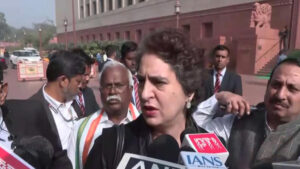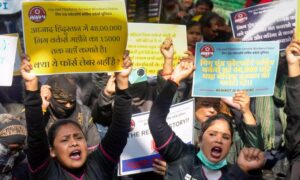“What Kind Of Democracy Do You Talk About?”

Kapil Sibal, a Rajya Sabha MP, urged the government to repeal the three bills it has brought to replace the Indian Penal Code, 1860, the Criminal Procedure Act, 1898, and the Indian Evidence Act, 1872. He alleged that if such laws become a reality, they would 'imperil the future' of the country
Former law minister Kapil Sibal on Sunday alleged that the government talks about ending colonial-era laws but it actually wants to impose ‘dictatorship’ through legislations such as the Bharatiya Nyaya Sanhita (BNS) Bill, which he called ‘unconstitutional’.
Sibal, a Rajya Sabha MP, urged the government to repeal the three bills it has brought to replace the Indian Penal Code, 1860, the Criminal Procedure Act, 1898, and the Indian Evidence Act, 1872. He alleged that if such laws become a reality, they would ‘imperil the future’ of the country.
“They (the NDA government) want to make such laws under which action can be taken against Supreme Court and high court judges, magistrates, public servants, CAG (Comptroller and Auditor General), and other government officials. They talk about ending colonial era laws, but their thinking is that they want to impose dictatorship in the country through laws,” said Sibal, while speaking at a press conference in New Delhi.
In reference to the BNS Bill, Sibal said that it is ‘dangerous’ and if it is passed, then only the government’s writ will run over all institutions. “I want to request judges to be vigilant. If such laws are passed, then the future of the country will be imperiled. I request you (the government) to take back these bills. We will tell the people what kind of democracy you want, one that throttles the people through laws and gags them,” said Sibal.
The former Congress leader dubbed the bill as “completely contrary to the independence of the judiciary”.
Slamming the government further, Sibal said, “Their thinking is clear that they don’t want democracy in this country. This is completely unconstitutional, it strikes at the root of the independence of the judiciary.”
Sibal cited sections 254, 255, 257 in the BNS Bill to allege that they are meant to ‘intimidate’ government officials, magistrate and judges to toe the government line.
“Which official will pass an order against the government? Which magistrate and judge will dare to go against the government? Even the British never used to do such a thing. Even kings did not do such a thing. What colonial mindset they are talking about… In their (government) hands, laws have become weapons,” Sibal claimed citing the provisions of the proposed laws.
“Do you want to scare public servants and tell the people that colonial era laws are being removed? But you are bringing laws more draconian than those of the colonial period. I want to ask Prime Minister Narendra Modi and Home Minister Amit Shah with what intention these laws have been introduced for consideration in the Lok Sabha,” he added.
Sibal alleged that the current government has ‘finished institutions’ and whatever remains will be ‘destroyed’ by the proposed laws. “Why Why do you then call yourself the mother of democracy? You must (instead) say that I am the father of dictatorship,” he said.
“Does any democracy in the world have such laws which you want to bring? What kind of democracy do you talk about?” Sibal asked, adding “You will not remain in power forever, then these laws could be used against you. Is this right?”
On Friday, Union Home Minister Amit Shah introduced in the Lok Sabha the BNS Bill, Bharatiya Nagarik Suraksha Sanhita (BNSS) Bill, and Bharatiya Sakshya (BS) Bill that will replace the Indian Penal Code, 1860, Criminal Procedure Code, 1898, and Indian Evidence Act, 1872, respectively.
Shah also urged Om Birla, Speaker, Lok Sabha, to refer the three bills for examination by the Parliamentary Standing Committee on Home Affairs.
Apart from other provisions, the three bills propose to repeal the sedition law and introduce a new provision with a wider definition of the offence.
The changes aimed at transforming the country’s justice system include provisions for defining terrorism (for the first time); maximum capital punishment for mob lynching, and for sexual assault of minors; maximum imprisonment of 20 years for all types of gang rape and community service as one of the punishments for first-time petty offences.





